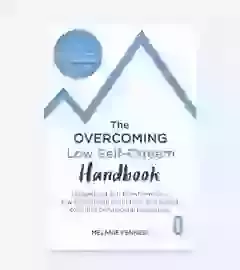What Causes Low Self-esteem?
The beliefs you have about yourself often appear to be statements of fact, although actually, they're really only opinions. They are based on the experiences you've had in life and the messages that these experiences have given you about the kind of person you are. If your experiences have been negative, your beliefs about yourself are likely to be negative too.
Crucial experiences that help to form our beliefs about ourselves often (although not always) occur early in life. What you saw, heard and experienced in childhood - in your family, in the wider community and at school - will have influenced the way you see yourself. Examples of early experiences that could lead to your thinking badly of yourself include:
- Systematic punishment, neglect or abuse
- Failing to meet parental standards
- Failing to meet peer-group standards
- Being on the receiving end of other people's stress or distress
- Belonging to a family or social group that other people are prejudiced towards
- An absence of praise, warmth, affection or interest
- Being the odd one out, at home or at school
Sometimes negative beliefs about yourself are caused by experiences later in life, such as workplace bullying or intimidation, abusive relationships, persistent stress or hardship, or traumatic events.
The Bottom Line
As we grow up we take the voices of people who were significant to us with us. We may criticize ourselves in their sharp tones, and make the same comparisons with other people that they did. Our experiences create a foundation for general conclusions about ourselves; judgements about ourselves as people. We can call these conclusions 'the Bottom Line'. The Bottom Line is the negative view of the self that lies at the heart of low self-esteem.
Because the Bottom Line is usually formed in childhood, it is usually biased and inaccurate, because it is based on a child's-eye view. It is likely to be formed on the basis of misunderstandings about experiences because you had no adult knowledge with which to understand properly what was going on. Although these beliefs may be unhelpful or outdated now, they come from a time when they made perfect sense, given what you were experiencing then.
Biased thinking
Once the Bottom Line is in place, it becomes increasingly difficult to question it. This is because it is maintained and strengthened by biased thinking, which means you give weight to anything that is consistent with your beliefs and discount anything that is not.
Two thinking biases contribute to low self-esteem: biased perception and biased interpretation. Biased perception means that you are swift to spot anything that fits with your negative ideas about yourself, and you screen out anything that contradicts them. So you focus on what you do wrong and ignore what you do right. Biased interpretation means that you distort the meanings you attach to what you experience - even if the experience is positive (so if someone compliments you on your appearance, you might think they meant that you must have been looking unattractive before, or that they didn't mean what they said and were just trying to be nice).
These biases operate together to keep the Bottom Line in place. You anticipate that things will turn out badly, and this makes you sensitive to any sign that they are turning out the way you expected. Also, no matter how things turn out, you are likely to interpret them negatively. This means that your memories of your ongoing experiences will also be negatively biased.
Negative beliefs about the self-are a bit like prejudices - beliefs that don't take account of all the facts but rely on biased evidence for their support.
Rules for Living
The Bottom Line leads to the development of Rules for Living: strategies for dealing with life on the assumption that the Bottom Line is true. Rules for Living enable you to function in the world - as long as you obey the rules. So, for example, if you have the negative belief 'I am stupid', your Rule for Living might be 'better not to try than to fail'. The problem with Rules for Living, however, is that, paradoxically, they also help to reinforce the Bottom Line.



















